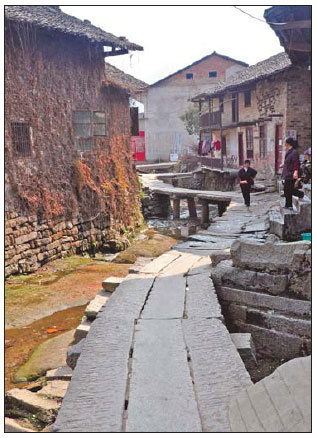Society
Where the village is really one big family
Updated: 2011-07-07 08:07
By Liu Xiangrui (China Daily)
|
Hunan's Zhang Guying village has 658 houses that are interconnected in a way that economizes the use of land. Liu Xiangrui / China Daily |
If the paradise that is Zhang Guying village is a proverbial Eden, then Zhang Guying is its allegorical Adam.
The peaceful settlement - the center is bathed in sunlight and border is rinsed by a babbling brook - at the base of Hunan province's Bijia Mountain is one of the country's few "kindred villages", where the 2,000-some residents claim a common ancestor.
As locals describe it, villagers "practically live under the same roof". The 600-year-old settlement's ancient dwellings are arranged in a dense cluster and preserved to the point the village is known by outsiders as "the Rural Forbidden City".
Legend has it the land was first settled by Zhang Guying, a 14th-century military commander who resigned after refusing a corrupt official's bribe. He moved to this swath of land with his family and two best friends, Liu Wangfu and Li Qianjin.
Zhang was a feng shui master and selected three housing lots at the alpine's heel that could respectively lure wealth, officialdom and prosperity for their descendents.
He let his friends choose first and was left with the plot believed to harness prosperity.
The multiplicity of their descendents extended the geomantic properties of the houses to what became three neighboring villages.
The Liu clan has remained wealthy, while many of Li's descendents are high officials and the Zhangs have flourished into several thousand over the past 26 generations. The village fills in a crescent beneath green foothills.
The brook is spanned by nearly 50 footbridges and tickles the doorsteps of riverside houses.
The rooftops create symmetrical grids pocked with courtyards. And the settlement's axial arrangement connects houses in a way that most economically uses available land.
The ancient structures' exteriors slant and droop, and their interiors are set with elaborately carved lattice windows, tiles and stones.
The village's Great Front House is perfectly symmetrical, down to the mirrors of its lotus pools on either side of the courtyard.
"They represent the two eyes of a dragon," explains 77-year-old Zhang Yunxin, a 19th-generation resident. They're not only aesthetically pleasing but serve the practical purpose of fire extinguishers, he says.
The complex is actually created from three different structures built in different centuries.
It houses 658 households in more than 1,700 rooms and covers more than 51,000 square meters.
Every interconnected four-hall unit is a self-organized system that incorporates three large courtyards and several smaller ones.
Every four-unit hall has places designated for living, ancestral worship, meetings, marriages and funerals. But it all seems identical to outsiders.
The web of 60 lanes, the longest of which is 153 meters, was initially designed to space buildings 80 centimeters apart to decrease the risk of fire.
"You can reach any house or any room without being exposed to sunlight or raindrops," Zhang says.
Each of the 206 courtyards has a skylight above and pit on the ground. The biggest is 22 square meters, while the smallest is only 2 square meters.
The design also facilitates draining and has never overflowed in the past six centuries. In place of drainpipes are two inconspicuous holes in the ground, which thirstily guzzle all excess water.
"They are designed according to feng shui, which says water should be hidden like wealth," Zhang explains.
The Zhang clan's motto is "filial piety and friendly neighborhood", and its precept reads, "It's better to leave our sons with a book than a houseful of gold."
"We never have to shut our doors, even when we're not home, because we're all a big family," Zhang says.
Villagers used to wash their feet outside of the school, where they studied for free before returning to the fields every day. The village has produced a number of learned men, Zhang says.
He speaks of the entire clan as if it's his immediate family. Perhaps that is why the Zhangs have prospered in this village for so many centuries.
China Daily
E-paper

Shining through
Chinese fireworks overcome cloudy times, pin hopes on burgeoning domestic demand
Pen mightier than the sword
Stroke of luck
Romance by the sea
Specials

90th anniversary of the CPC
The Party has been leading the country and people to prosperity.

My China story
Foreign readers are invited to share your China stories.

Green makeover
Cleanup of Xi'an wasteland pays off for ancient city

